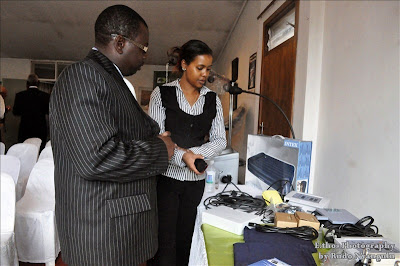Today is a great day for St Giles Medical Rehabilitation Centre, as they have
received their biggest donation in ten years from Mimosa Mining
Company.
The Donation handover began with a quick tour of the physiotherapy and
occupational therapy departments. Thereafter Mr Mawerera the master of ceremony
welcomed all guests and introduced board members, staff members and
special guests. We then had the CEO of St Giles, Mr Nsangwe give the official welcome followed by the
Chairman of the St Giles Board, Advocate V.S Nyangulu who gave a vote of thanks to fellow board members, St. Giles Staff and a special
thanks to Mimosa Mining Company.
Advocate Nyangulu shared how the support of
some corporate entities had allowed St. Giles to be able to buy a new
generator, stove and carpet some area as well as paint section of the
centre.
Advocate Nyangulu then spoke of the work that St Giles carries out and the challenges that they are
facing in achieving their goals. He explained how the challenges that St Giles
faced are very real and numerous. He appealed for more companies and individuals as they are able to follow the example set by the Mimosa Mining Company and help St. Giles to continue its vital work and improve its facilities for the benefit of the patients.
The MD of
Mimosa Mining Company Mr Chitando gave his speech thereafter; he explained how he learnt of
the St Giles Medical Rehabilitation Centre from a lady he worked with in 1987-88 in
Hwange. This lady had suffered a stroke and was admitted to St Giles for rehabilitation where he had visited her
and saw how quickly she was recovering under the care of the St. Giles team. He told of how Mimosa Mining Company is involved in platinum mining
in Zvishavane employing approx 1800 people.They started operating as a project in 1994 and formalised their company 1997. Mimosa Mining Company has a very strong sense of their 'Corporate Social Responisbility' (CSR). Within CSR their main areas of focus are health and education. Mr Chitando said that this is the beginging of what he hoped to be a good and long relationship between St Giles and
Mimosa Mining Company.
Mimosa has
provided The St Giles with; a shortwave diathermy, UV light,
treadmill set, EARAF power pack for sonopulse 190, wax bath, stationery bike,
ultra sound machine, 2 tens machines, massage vibrator, hot pack unit, a home
gym, interferential and an air mattress. This equipment is mostly beneficial to
the physiotherapy department and has replaced the majority of their redundant equipment as well as brought in new equipment to make the rehabilitation process easier and quicker for the patients.
Photography courtesy of E:thos photography by rudo nyangulu
Tour of the physotherapy and Ocupational Therapy Departments
The official presentation from Mimosa Mining Company to St. Giles Medical Rehabilitation Centre
 |
| CEO of St Giles, Mr Nsangwe giving his speach |
 |
| Chairman of the St. Giles board, Advocate Nyangulu giving his speach |
 |
| MD of Mimosa Mining Company Mr Chitando giving his speach |
The hadover of the equipment by Mr Chitando on behalf of Mimosa Mining Company to Advocate Nyangulu on behalf of St Giles.
The reception after the handover







































